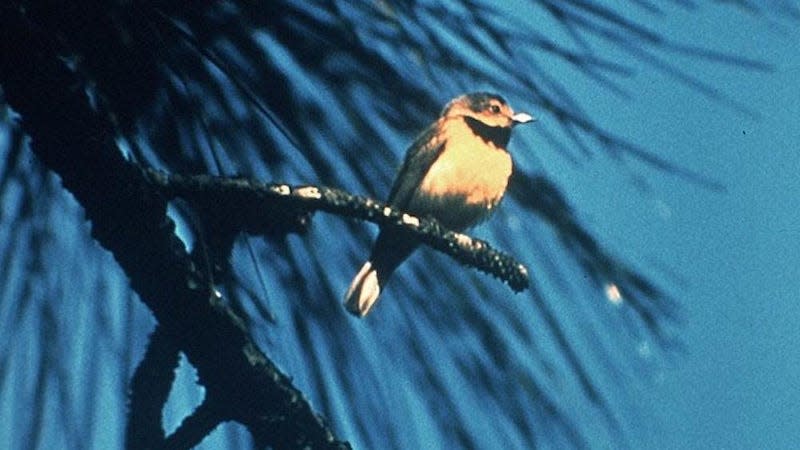U.S. Endangered Species List Gets 21 Species Smaller (in the Bad Way)

A lone male Bachman’s Warbler, now extinct.
The U.S. is officially saying goodbye to 21 species that have been feared gone for years. These animals, which include many birds and marine mammals, have been delisted from the Endangered Species Act because they are now declared extinct, the U.S. Fish and Wildlife Service said this week. One famous bird, the ivory-billed woodpecker, was meant to be included in this delisting but has been given another chance, as a group of dedicated birders wage an improbable fight to prove that it may still exist in the American south.
You can see the full list of now-officially-extinct creatures here. It includes one mammal, the Little Mariana fruit bat from Guam. There are 10 birds on the list, including the Molokai creeper, the Large Kauai thrush, and the Kauai akialoa. Most of the birds on the list called Hawaii home; two others were from Florida and Guam. The San Marcos gambusia and the Scioto madtom are the two fish, and the rest of the creatures are freshwater mussels, most of which were native to Gulf states.
Read more
Jada Pinkett-Smith Finally Responds to Internet Rumors That She's Gay
Is ESPN ethically obligated to shut down wild speculation on the Pat McAfee show?
Baldur’s Gate 3’s Least Popular Race Is Also Its Most Powerful
Florida Man Goes Full Send, Launches Dodge Challenger Into Canal
Some plants and animals are pushed out by invasive species that prey on native wildlife or take up their resources. For example, Hawaiian honeycreepers were wiped out by habitat loss and diseases spread by non-native mosquitoes, NPR reported.
For those not ready to give up hope, there are recorded instances of ‘extinct’ creatures being found alive again. These Lazarus species make for thrilling stories, but unfortunately, the vast majority of delisted species truly are gone for good.
Want more climate and environment stories? Check out Earther’s guides to decarbonizing your home, divesting from fossil fuels, packing a disaster go bag, and overcoming climate dread. And don’t miss our coverage of the latest IEA report on clean energy, the future of carbon dioxide removal, and the invasive plants you should rip to shreds.
More from Gizmodo
Beverly Hills Cops Are So Racist They Racially Profiled Two On-Duty LAPD Officers
'Blood Brothers' Kill Woman After Throwing A Rock Through Car Windshield
19 Things We Wish We Knew About Spider-Man 2 Before We Started
Sign up for Gizmodo's Newsletter. For the latest news, Facebook, Twitter and Instagram.

